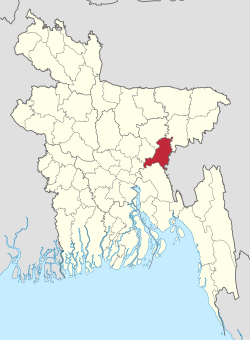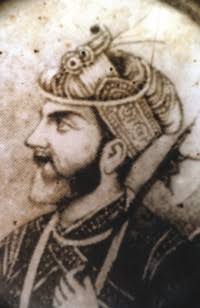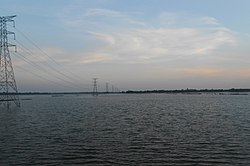Brahmanbaria District
Brahmanbaria
ব্রাহ্মণবাড়িয়া | |
|---|---|
Clockwise from top-left: Shahid Minar in Brahmanbaria, Haripur Barabari, Kal Bhairab Temple, Akhaura, Arifil Mosque | |
 Expandable map of Brahmanbaria District | |
 | |
| Coordinates: 23°59′N 91°07′E / 23.983°N 91.117°E | |
| Country | |
| Division | Chittagong |
| Established | 15 February 1984 (split from Comilla) |
| Headquarters | Brahmanbaria |
| Government | |
| • Deputy Commissioner | Hayat-ud-Dowllah Khan |
| Area | |
• Total | 1,881.20 km2 (726.34 sq mi) |
| Population | |
• Total | 3,306,563 |
| • Density | 1,800/km2 (4,600/sq mi) |
| Demonym | Brahmanbarian |
| Time zone | UTC+06:00 (BST) |
| Postal code | 3400 |
| Area code | 0851 |
| ISO 3166 code | BD-04 |
| HDI (2018) | 0.614[2] medium · 7th of 21 |
| Website | www |
Brahmanbaria (Bengali: ব্রাহ্মণবাড়িয়া, romanized: Brammôṇbaṛiya) is a district in eastern Bangladesh located in the Chittagong Division. Geographically, it is mostly farmland and is topographically part of the Gangetic Plain. It is bounded by the districts of Kishoreganj and Habiganj to the north, Narsingdi District and Narayanganj to the west, Comilla to the south, and the Indian state of Tripura to the east. It was a part of Comilla District until 15 February 1984.[3]
History
[edit]

Brahmanbaria was a part of Samatata region of ancient Bengal.[4] The area Syed Mahmud resided in was named Kazipara (Kazi being a variant of Qadi) after him, and his mazar (mausoleum) remains there.[5]
The leader of the Baro-Bhuiyan zamindars, Isa Khan, had his first and temporary capital situated in Sarail.[6] Brahmanbaria was made part of the Sylhet Sarkar. During the Mughal era, Brahmanbaria was famous for producing quality cloth muslin.[7][8]
Brahmanbaria was made one of the three subdivisions of Comilla District by the British colonialists in 1790.[9] The Brahmanbaria Municipality was established in 1868. During the 19th century, Brahmanbaria produced many nationalist leaders like Nawab Syed Shamsul Huda, who became president of the All India Muslim League in 1921 and Barrister Abdur Rasul, a front ranking leader of Indian National Congress.[10] When the Swadeshi movement began in the wake of the 1905 Partition of Bengal, Brahmanbaria-born revolutionary Ullaskar Datta Aviram was convicted for throwing bomb explosion and was deported to the Andamans. It became part of East Pakistan in 1947. Upon encouragement of Oli Ahad, a Brahmanbarian Bengali Language Movement leader, the movement obtained momentum in this district in 1952.[11][12]
During the Bangladesh Liberation War in 1971, Mohammad Mostafa Kamal faced a heroic death in an encounter with the Pakistani army at Daruin in what is now Akhaura Upazila.[13] One of the most distinguished Brahmanbarian military generals Shakil Ahmed was murdered in the Bangladesh Rifles revolt in 2009.[14][15] In 2015, a pot of 200-year-old coins was found in the district's Akhaura Upazila. There were nearly 500 coins at the Temple of Durga in Mogra Union and contained images of British queen Elizabeth I and were from 1804, 1814 and 1836. According to the police, the coins were handed over to the Department of Archaeology.[16]
In March 2013, a deadly tornado killed at least 31 people in 25 villages and caused serious damage.[citation needed]
Demographics
[edit]| Year | Pop. | ±% p.a. |
|---|---|---|
| 1974 | 1,473,049 | — |
| 1981 | 1,728,272 | +2.31% |
| 1991 | 2,141,745 | +2.17% |
| 2001 | 2,398,254 | +1.14% |
| 2011 | 2,840,498 | +1.71% |
| 2022 | 3,306,563 | +1.39% |
| Sources:[1][17] | ||
According to the 2022 Census of Bangladesh, Brahmanbaria District had 712,578 households and a population of 3,306,563 with an average 4.57 people per household. Among the population, 798,979 (24.16%) inhabitants were under 10 years of age. The population density was 1,758 people per km2. Brahmanbaria District had a literacy rate (age 7 and over) of 72.12%, compared to the national average of 74.80%, and a sex ratio of 1149 females per 1000 males. Approximately, 20.62% of the population lived in urban areas. The ethnic population was 672.[1]
| Religion | 1941[18]: 102–103 [a] | 1981[17] | 1991[17] | 2001[17] | 2011[17] | 2022[1] | ||||||
|---|---|---|---|---|---|---|---|---|---|---|---|---|
| Pop. | % | Pop. | % | Pop. | % | Pop. | % | Pop. | % | Pop. | % | |
| Islam |
712,470 | 68.52% | 1,541,739 | 89.21% | 1,943,271 | 90.73% | 2,195,583 | 91.55% | 2,627,810 | 92.51% | 3,084,642 | 93.29% |
| Hinduism |
326,888 | 31.44% | 184,809 | 10.69% | 194,333 | 9.07% | 201,843 | 8.42% | 211,899 | 7.46% | 220,960 | 6.68% |
| Others [b] | 445 | 0.04% | 1,724 | 0.10% | 4,141 | 0.20% | 828 | 0.03% | 789 | 0.03% | 961 | 0.03% |
| Total Population | 1,039,803 | 100% | 1,728,272 | 100% | 2,141,745 | 100% | 2,398,254 | 100% | 2,840,498 | 100% | 3,306,563 | 100% |
In 2011, Muslims made up 92.51% of the population, while Hindus were 7.46% of the population.[17] In 2022, Muslims were 93.29% and Hindus 6.68% of the population.
Administration
[edit]

Brahmanbaria District, previously a subdivision of Comilla district (formerly Tippera district till 1960), was established in 1984. The district has 4 municipalities, 39 wards, 97 mahallas, 9 upazilas, 98 union parishads, 1081 moussakas and 1329 villages.
The administrative seat and largest city is Brahmanbaria. The towns of Akhaura and Ashuganj also rank in the top three of the district.
Upazilas
[edit]Brahmanbaria district is divided into nine upazilas (subdistricts) as below:
- Brahmanbaria Sadar Upazila
- Kasba Upazila
- Akhaura Upazila
- Ashuganj Upazila
- Bancharampur Upazila
- Bijoynagar Upazila
- Nasirnagar Upazila
- Nabinagar Upazila
- Sarail Upazila
Parliamentary constituencies
[edit]There are six Jatiya Sangsad constituencies in the district. These constituencies and the current Members of Parliament are:[19]
- National seat no 243 Brahmanbaria-1 (Current MP, Syed AK Ekramuzzaman)
- National seat no 244 Brahmanbaria-2 (Current MP, Md Mainuddin)
- National seat no 245 Brahmanbaria-3 (Current MP, R. A. M. Obaidul Muktadir Chowdhury)
- National seat no 246 Brahmanbaria-4 (Current MP, Anisul Huq, Minister of Law)
- National seat no 247 Brahmanbaria-5 (Current MP, Mohammad Ebadul Karim Bulbul)
- National seat no 248 Brahmanbaria-6 (Current MP, AB Tajul Islam)
District Magistrates
[edit]Deputy Commissioner (DC), or District Magistrate, is the chief administrative and revenue officer of Brahmanbaria District. The following is a list of those that held this office:
| Number | Name | Term |
|---|---|---|
| 01 | Muhammad Nizam ad-Din | 15/2/1984 - 4/8/1986 |
| 02 | AZM Shafiqul Islam | 4/8/1986 - 6/3/1989 |
| 03 | Khan Shahab ad-Din | 6/3/1989 - 8/1/1991 |
| 04 | Kabir ad-Din Ahmad | 8/1/1991 - 2/3/1993 |
| 05 | Muhammad Abd al-Matin | 2/3/1993 - 15/11/1995 |
| 06 | Muhammad Ghulam Kibriya | 22/11/1995 - 28/10/1996 |
| 07 | AKM Wahidul Islam | 28/10/1996 - 15/7/1999 |
| 08 | Lutfur Rahman | 15/7/1999 - 29/3/2001 |
| 09 | Badrul Alam Tarafdar | 29/3/2001 - 1/1/2002 |
| 10 | Muhammad Muqsid Ali | 3/1/2002 - 30/11/2003 |
| 11 | Muhammad Yunusur Rahman | 30/11/2003 - 21/7/2004 |
| 12 | Muhammad Zahirul Haq | 21/7/2004 - 23/4/2005 |
| 13 | Muhammad Saidur Rahman | 23/4/2005 - 21/9/2006 |
| 14 | Muhammad Ali Akbar | 21/9/2006 - 16/11/2006 |
| 15 | Syed Ahmad Chhapa | 19/11/2006 - 14/5/2007 |
| 16 | Muhammad Abd al-Hayy | 14/5/2007 - 17/4/2009 |
| 17 | Muhammad Hayyul Qayyum | 26/4/2009 - 26/4/2010 |
| 18 | Muhammad Abd al-Mannan | 26/4/2010 - 20/10/2012 |
| 19 | Nur Muhammad Majumdar | 21/10/2012 - 28/12/2013 |
| 20 | Muhammad Musharraf Husayn | 28/12/2013 - 19/9/2016 |
| 21 | Rezwanur Rahman | 19/9/2016 - |
| 22 | Hayat ud-Dawlah Khan | 9/10/2018 - 5/01/2022 |
| 22 | Md Shahgir Alam[20] | 13/01/2022[21]-present |

Economy
[edit]
Brahmanbaria is one of the fastest growing districts in the country. The major industries of Brahmanbaria District have been: agriculture, fishing, power and electricity, and natural gas.[citation needed] 30% of its population is below the poverty threshold.[22] It has a labour force of 1,800,000 that are skilled in agricultural, industrial, and service sectors. As of 2010, it had an unemployment rate of 3.8%.
Power and gas
[edit]
Brahmanbaria's Titas gas is the largest gas field of Bangladesh. It supplies natural gas to Dhaka and most other parts of the nation. Currently the government is drilling new wells.[23]
In some other parts of Brahmanbaria, gas was found. It resulted in an abrupt fall in the price of gas.[24] Many parts of the country people are using gas in many illegal ways. Now, the government is trying to solve that issue.[25]
Transport
[edit]
This district has the largest railway junction in the country at Akhaura.[26] It connects to Kulaura and Chhatak with the Akhaura–Kulaura–Chhatak line, to Laksam and Chittagong with the Akhaura–Laksam–Chittagong line, and to Tongi and Bhairab with the Tongi–Bhairab–Akhaura line. There are about ten railway stations in the district. Recently the government of India shipped machines of the Palatana project from Kolkata to Agartala by using the Ashuganj river port on Meghna in Brahmanbaria district.[27] Rail networks linking it to other parts of the country include the Parabat Express and Kalni Express. Brahmanbaria connects with the Asian Highway Network through the N2 highway and there is also the prominent N102 highway. To connect with India, government of both Bangladesh and India is building 15 km railway from Akhaura to Agartala.[28]
Prime Minister of Bangladesh Sheikh Hasina gave the Government of India permission to use the Port of Ashuganj.[29] In addition, Akhaura Station will be connected to Agartala.[30]
Tourism
[edit]Brahmanbaria has a number of tourist attractions and sites dating back many centuries. The Kharampur Mazar Sharif is a mausoleum complex located in Akhaura which attracts hundreds of visitors. It contains the tomb of Syed Ahmad Gesudaraz, a 14th-century Islamic preacher who took part in the Conquest of Sylhet before settling in Kharampur where he was martyred. During the dewani of Shahbaz Khan in 1650, the Hatirpul was constructed. It was a bridge built over the canal mainly for elephant pass. The Mughal dewans used to communicate by the elephant in this road and also took rest near this bridge. In 1662, the Arifil Mosque was constructed by Shah Arif in Sarail. There are unknown tombs located near the mosque, supposedly the wives of Isa Khan. The 18th century Haripur Barabari was a residential palace located in Nasirnagar and many movies have been filmed there. The India-Bangladesh Border Haat located in Kasba is a weekly marketplace and allows communication with the people of the neighbouring country. Sports fans assemble at the Niaz Mohammad Stadium which was constructed in 1934.
Criticism
[edit]In 2015, Brahmanbaria faced problems of road blocks due to political agitation.[31] The situation did not last very long before being resolved. This region also faced with clashing between two groups. In 2015, a man was killed for facing problems between two groups.[32] Former Chief Justice of Bangladesh, Surendra Kumar Sinha had said while he was delivering his speech in Brahmanbaria that smuggling was hurting the national the economy.[33] Gold and dollar are going out of the country, he said.
Notable people
[edit]Notes
[edit]- ^ Brahmanbaria subdivision of Tippera district
- ^ Including Jainism, Christianity, Buddhism, Zoroastrianism, Judaism, Ad-Dharmis, or not stated
References
[edit]- ^ a b c d e Population and Housing Census 2022 National Report (PDF). Vol. 1. Bangladesh Bureau of Statistics. November 2023. pp. 149–151, 179–181, 191–192, 407.
- ^ "Sub-national HDI - Area Database - Global Data Lab". hdi.globaldatalab.org. Retrieved 2020-03-18.
- ^ Musa, Muhammad. Brahmanbariar Itibrittyo, Shetu Prokashoni, Brahmanbaria,1998.
- ^ Douglas A. Phillips; Charles F. Gritzner (2007). Bangladesh. Infobase Publishing. p. 32. ISBN 978-1-4381-0485-0.
- ^ কাজী মাহমুদ শাহ (রহ) মাজার. Brahmanbaria Sadar Upazila (in Bengali).
- ^ AA Sheikh Md Asrarul Hoque Chisti (2012). "Isa Khan". In Sirajul Islam; Miah, Sajahan; Khanam, Mahfuza; Ahmed, Sabbir (eds.). Banglapedia: the National Encyclopedia of Bangladesh (Online ed.). Dhaka, Bangladesh: Banglapedia Trust, Asiatic Society of Bangladesh. ISBN 984-32-0576-6. OCLC 52727562. OL 30677644M. Retrieved 22 November 2024.
- ^ Eaton, Richard Maxwell (1996). The Rise of Islam and the Bengal Frontier, 1204–1760. University of California Press. p. 202. ISBN 978-0-520-20507-9.
- ^ Abdul Karim (2012). "Muslin". In Sirajul Islam; Miah, Sajahan; Khanam, Mahfuza; Ahmed, Sabbir (eds.). Banglapedia: the National Encyclopedia of Bangladesh (Online ed.). Dhaka, Bangladesh: Banglapedia Trust, Asiatic Society of Bangladesh. ISBN 984-32-0576-6. OCLC 52727562. OL 30677644M. Retrieved 22 November 2024.
- ^ Siddiqi, Mamun (2012). "Comilla District". In Islam, Sirajul; Jamal, Ahmed A. (eds.). Banglapedia: National Encyclopedia of Bangladesh (Second ed.). Asiatic Society of Bangladesh.
- ^ "Nasirnagar Upazilla". Bangladesh National Portal.
- ^ "Language warrior Oli Ahad dead". bdnews24.com. Retrieved 21 October 2012.
- ^ "Oli Ahad no more". The Daily Star. Dhaka, Bangladesh. 21 October 2012. p. 1. Retrieved 2012-10-21.
- ^ Chandan, Md Shahnawaz Khan. "A Hero's Tale". The Daily Star. Retrieved 18 June 2015.
- ^ "My friend . . . the scholar-soldier". The Business Standard (Opinion). 25 February 2020.
- ^ "M G Shakil ( মেজর জেনারেল শাকিল) বিডিআর হত্যাকান্ডে নিহত হন । সেই সময়ের একটি তথ্যচিত্র।". YouTube.
- ^ "200-year-old coins recovered". Dhaka Tribune.
- ^ a b c d e f "Bangladesh Population and Housing Census 2011 Zila Report – Brahmanbaria" (PDF). Bangladesh Bureau of Statistics. Archived from the original (PDF) on 2018-06-12. Retrieved 2023-10-23.
- ^ "Census of India, 1941 Volume VI Bengal Province" (PDF).
- ^ বাংলাদেশ (Bangladesh) জাতীয় তথ্য বাতায়ন - গণপ্রজাতন্ত্রী বাংলাদেশ সরকার - People's Republic of Bangladesh. bangladesh.gov.bd.
- ^ ব্রাহ্মণবাড়িয়ার নতুন ডিসি শাহগীর আলম. The Dhaka Post (in Bengali). Retrieved 2022-07-24.
- ^ "Current DC of Brahmanbaria District". www.brahmanbaria.gov.bd. Retrieved 2022-07-24.
- ^ "Zila level povmap estimates, 2010" (PDF). Bangladesh Bureau of Statistics.
- ^ "Titas Starts New Well Drilling". Energy Bangla. 20 December 2015.
- ^ "Regulator to look into unusual fall in prices of Titas Gas stocks". The Daily Star.
- ^ "Titas struggles to remove illegal gas connections". Dhaka Tribune.
- ^ "AKA/Akhaura Junction Railway Station Map/Atlas". India Rail Info.
- ^ "Bangladesh to ink pact with India for 100MW power from Tripura". The Times of India.
- ^ "India, Bangladesh business set to grow through ports, waterways". The Economic Times.
- ^ "B'desh agrees to allow India use waterways to Ashuganj port". Business Standard. Press Trust of India. 3 May 2014.
- ^ "Government approves Rs 1,000 crore for India-Bangladesh rail link". The Economic Times. Archived from the original on October 1, 2015.
- ^ "CNG drivers block Brahmanbaria highways". Prothom Alo. 2 September 2015. Archived from the original on 17 January 2017. Retrieved 15 February 2018.
- ^ "Man killed in Brahmanbaria clash". Dhaka Tribune.
- ^ "Smuggling hurting economy: SK Sinha". The Daily Star.






